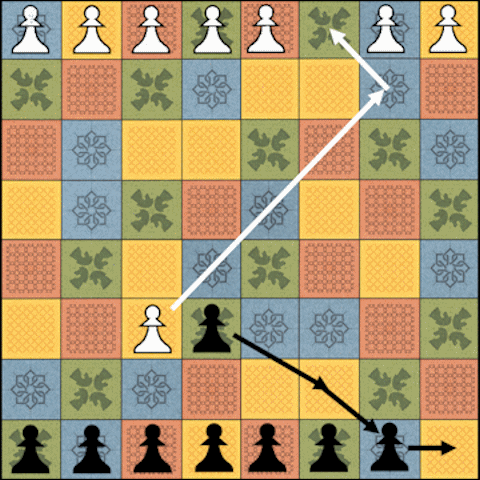
The original game for which the board was designed, Colorado is a cross between a race game and a war game.
Object. To be the first to get all your pawns across the board from your own baseline to your opponent's (your 'homing' rank). 'All' does not necessarily mean all eight but only all those remaining if any are captured. You can therefore win by getting only one pawn home if your other seven are gone. Alternatively, you can win by capturing all eight enemy pawns.
Play. Normal Katarenga rules apply, including the prohibition on capturing on your first move.
When you get a pawn home to the opposite baseline your opponent may, if possible, use their next move to capture it. If not captured immediately, it becomes invulnerable so long as it remains on the same homing square. It can be moved again, whether or not to another square on the home rank, but every time it lands on a square on that rank it again becomes vulnerable to capture for one move only.
The game ends as soon as one player wins by getting their last remaining pawn home, by capturing the last remaining enemy pawn, or (unusually) when their last remaining unhomed pawn is captured, at least one of the others being already home.
Continuation. After the first game rotate the board through 180 degrees and play from the opposite baselines, the player who moved second in the first game moving first in the second. For a double game, rotate the board through 90 degrees and play twice again starting from the other sides.
Strategy. Colorado is unusual in that it has two conflicting objectives. If you set out to win by capturing all enemy pawns and your opponent manages to get at least one home, then not only are they saved from annihilation but also will find it easier to get their remaining pawns home, as the fewer they have left on the board the more empty homing squares there are to manoeuvre them into. Conversely, once you have got a pawn home you will want to encourage your opponent to capture as many as possible to make it easier to get your few remaining pawns to the opposite side. Thus it may or may not be a good thing to indulge in multiple captures, depending on the situation and how confident you are of winning.
Scoring (optional). You can play Colorado as a simple binary game (win/lose) or, if playing a series of games, with a scoring system whereby the winner scores 1 point for each pawn they get home.
Reminder

Pawns move from red like a rook, from yellow like a bishop, from green like a knight, from blue like a king and not beyond the next square of the colour it started from. It may not jump or land on another pawn except to capture one of the opponent's.

